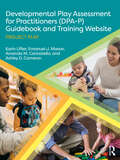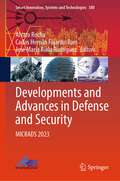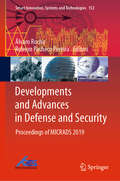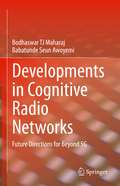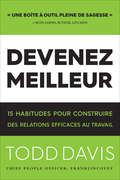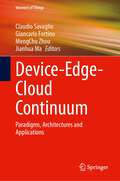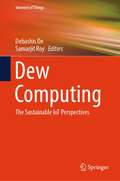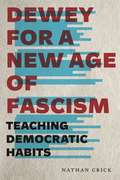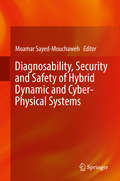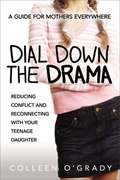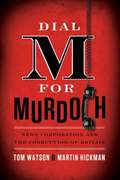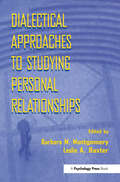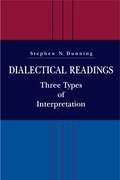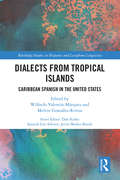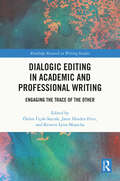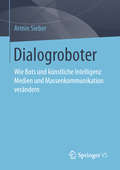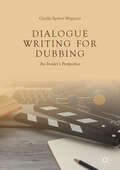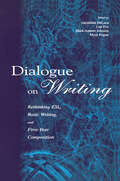- Table View
- List View
Developmental Play Assessment for Practitioners (DPA-P) Guidebook and Training Website: Project Play
by Karin Lifter Emanuel J. Mason Amanda M. Cannarella Ashley D. CameronDevelopmental Play Assessment for Practitioners (DPA-P) Guidebook and Training Website: Project Play offers a comprehensive assessment of naturally occurring play activities for evaluating young children’s developmental progress accurately, so that useful interventions can take place as early as possible. It can be used by practitioners in a wide range of educational and therapeutic settings and is designed to support developmental progress through planning interventions in play, and using what we know about a child’s progress in play to plan play-based interventions in cognition, language, motor, social-emotional, and self-help skills. The guidebook and training website provide a comprehensive introduction to how to successfully use the assessment with infants, toddlers, and young children with disabilities or at risk for disabilities. The comprehensive guidebook offers an overview of the DPA-P and Project Play, defines play, discusses the background literature on play, and explains why this assessment is needed. Clear guidance helps practitioners and family members understand play, how to evaluate play, and how to use play for different purposes. The guidebook offers: an introduction to the comprehensive training website and how to use it understanding of the categories of play assessed and their definitions guidance on how to administer the assessment and prepare a summary evaluation of a child’s performance clear instructions for the coding sheets and scoring guidelines for constructing sets of toys guidance on taking the results of the DPA-P evaluation of a child’s progress in play to develop a plan of activities for intervention explanation of how you evaluate activities at the absence, basic, emergence, and mastery levels for developing a plan suggestions for assembling sets of toys for intervention, based on toys available in children’s homes and early childhood settings procedures for facilitating or teaching play activities to children who are developing more slowly than their peers technical aspects of the assessment To make the DPA-P as flexible as possible for all practitioners, it also offers guidance on adaptations for administering the test, in the coding sheets, with toys to enhance cultural appropriateness for gathering the observations, and for supporting interventions in play. The Developmental Play Assessment for Practitioners (DPA-P) can be used in natural settings and takes 30 minutes to complete. It is a valuable tool for all those who serve, or are training to serve, young children in early childhood settings, schools, service agencies, colleges, and universities. It will be of great benefit for early intervention personnel, speech-language pathologists, physical therapists, occupational therapists, and psychologists.
Developments and Advances in Defense and Security: MICRADS 2023 (Smart Innovation, Systems and Technologies #380)
by Álvaro Rocha José María Riola Rodríguez Carlos Hernán Fajardo-ToroThis book gathers the proceedings of the Multidisciplinary International Conference of Research Applied to Defense and Security (MICRADS 2023), held at Graduate School of the Colombian Air Force, in Bogota, Colombia, during July 6–8, 2023. It covers a broad range of topics in systems, communication, and defense; strategy and political–administrative vision in defense; and engineering and technologies applied to defense. Given its scope, it offers a valuable resource for practitioners, researchers, and students alike.
Developments and Advances in Defense and Security: Proceedings of MICRADS 2019 (Smart Innovation, Systems and Technologies #152)
by Álvaro Rocha Robson Pacheco PereiraThis book gathers the proceedings of the Multidisciplinary International Conference of Research Applied to Defense and Security (MICRADS), held at the Military Engineering Institute, Rio de Janeiro, Brazil, from 8 to 10th May 2019. It covers a variety of topics in systems, communication and defense; strategy and political-administrative vision in defense; and engineering and technologies applied to defense. Given its scope, it offers a valuable resource for practitioners, researchers, and students alike.
Developments and Advances in Defense and Security: Proceedings of MICRADS 2020 (Smart Innovation, Systems and Technologies #181)
by Álvaro Rocha Teresa Guarda Manolo Paredes-CalderónThis book gathers the proceedings of the Multidisciplinary International Conference of Research Applied to Defense and Security (MICRADS), held at the Eloy Alfaro Military Academy (ESMIL) in Quito, Ecuador, on May 13–15,2020. It covers a broad range of topics in systems, communication, and defense; strategy and political–administrative vision in defense; and engineering and technologies applied to defense. Given its scope, it offers a valuable resource for practitioners, researchers, and students alike.
Developments and Advances in Defense and Security: Proceedings of MICRADS 2021 (Smart Innovation, Systems and Technologies #255)
by Álvaro Rocha Carlos Hernan Fajardo-Toro José María Riola RodríguezThis book gathers the proceedings of the Multidisciplinary International Conference of Research Applied to Defense and Security (MICRADS 2021), held at Naval Cadet School "Almirante Padilla", in Cartagena, Colombia, during August 18–20, 2021. It covers a broad range of topics in systems, communication, and defense; strategy and political–administrative vision in defense; and engineering and technologies applied to defense. Given its scope, it offers a valuable resource for practitioners, researchers, and students alike.
Developments and Advances in Defense and Security: Proceedings of MICRADS 2022 (Smart Innovation, Systems and Technologies #328)
by Álvaro Rocha Carlos Hernan Fajardo-Toro José María RiolaThis book gathers the proceedings of the Multidisciplinary International Conference of Research Applied to Defense and Security (MICRADS 2022), held at Escuela Naval de Suboficiales ARC "Barranquilla," in Barranquilla, Colombia, during July 11–13, 2022. It covers a broad range of topics in systems, communication, and defense; strategy and political–administrative vision in defense; and engineering and technologies applied to defense. Given its scope, it offers a valuable resource for practitioners, researchers, and students alike.
Developments in Cognitive Radio Networks: Future Directions for Beyond 5G
by Bodhaswar TJ Maharaj Babatunde Seun AwoyemiThis book provides holistic yet concise information on what modern cognitive radio networks are, how they work, and the possible future directions for them. The authors first present the most generic models of modern cognitive radio networks, taking into consideration their different architectural designs and classifications. While the spectrum resource is shown to be the most important resource for the cognitive radio networks, the book exposes the importance of the other resources that are needed to help drive the technology. The book then discusses in-depth the key tools (such as optimization and queuing theory) and techniques (such as cooperative diversity and relaying) that are being employed to formulate resource problems, investigate solutions, and interpret such solutions for useful and practical modern cognitive radio networks realization. Further, the book studies the impact of modern cognitive radio networks on other emerging technologies -- such as 5G, Internet of Things, and advanced wireless sensor networks -- and discusses the role that cognitive radio networks play in the evolution of smart cities and in the realization of a highly interconnected world. In discussing the future of the cognitive radio networks, the book emphasizes the need to advance new or improved tools, techniques, and solutions to address lingering problems in the aspects of resource realization and utilization, network complexity, network security, etc., which can potentially limit the cognitive radio networks in their stride to becoming one of the most promising technologies for the immediate and near future.
Devenez Meilleur: 15 Habitudes Pour Construire Des Relations Efficaces Au Travail
by Todd Davis“Une bo?te à outil pleine de sagesse” de les experts en amélioration de la performance chez FranklinCovey (Seth Godin, auteur, Linchpin).Un guide practique pour tous ceux qui cerchent à créer un avantage concurrentiel dans n’importe quelle taille et type d’organisation en établissant des relations efficacies. Dans ce livre Todd Davis, Chief People Officer de FranklinCovey, explique que le meilleur atout d’une organisation n’est pas son personnel; ce sont plut?t les relations entre ses members qui prédisent le mieux l’efficacité personnelle. En fin de compte, la capacité des employés à établir et maintenir de bonnes relations est l’avantage concurrentiel ultime d’une organisation. Il identifie quinze pratiques éprouvées que les dirigeants influents à tous les niveaux d’une organisation utilisent pour s’approprier leur travail, améliorer la qualité des interactions avec les autres et ma?triser les compétences de relations efficacies.
Device-Edge-Cloud Continuum: Paradigms, Architectures and Applications (Internet of Things)
by Giancarlo Fortino Jianhua Ma MengChu Zhou Claudio SavaglioThis book focuses on both theoretical and practical aspects of the “Device-Edge-Cloud continuum”, a development approach aimed at the seamless provision of next-generation cyber-physical services through the dynamic orchestration of heterogeneous computing resources, located at different distances to the user and featured by different peculiarities (high responsiveness, high computing power, etc.). The book specifically explores recent advances in paradigms, architectures, models, and applications for the “Device-Edge-Cloud continuum”, which raises many 'in-the-small' and 'in-the-large' issues involving device programming, system architectures and methods for the development of IoT ecosystem. In this direction, the contributions presented in the book propose original solutions and aim at relevant domains spanning from healthcare to industry, agriculture and transportation.
Dew Computing: The Sustainable IoT Perspectives (Internet of Things)
by Debashis De Samarjit RoyThis book discusses the dew computing paradigm with the evolution of future-generation technologies through the cloud and the Internet of Things in the scope of machine intelligence. Dew computing is an emerging paradigm that inherits a flexible and super-hybrid methodology to afford personal information to users with self-regulating internetwork connectivity. The contents conceptualize how the end-users can benefit from data analytics through intelligent data sensing, computing, analytics, and distributed scenarios using a dew-cloud computational framework over the Internet of Things environment. The main focus of this book is to bring all the related technologies into a single platform so that undergraduate and postgraduate students, researchers, academicians, and the industry can easily understand dew computing, future generations of cloud computing, machine intelligence, and representation learning in IoT-enabled technologies.
Dewey for a New Age of Fascism: Teaching Democratic Habits (Rhetoric and Democratic Deliberation #22)
by Nathan CrickDuring the rise of fascism in the early twentieth century, American philosopher and educational reformer John Dewey argued that the greatest threat to democracy was not a political regime or even an aggressive foreign power but rather a set of dispositions or attitudes. Though not fascist in and of themselves, these habits of thought—rugged individualism and ideological nationalism—lay the foundation for fascism. In this study, Nathan Crick uses Dewey’s social thought and philosophy of education to provide insight into and resources for transforming our present-day politics.Through a close reading of Dewey’s political writings and educational theory, Crick elaborates Dewey’s vision of democratic social life and the education required for its foundation. He shows that for Dewey, communication is essential to cultivating sympathy, intelligence, and creativity—habits of thought that form the core of democratic culture. Crick then lays out a broad curriculum of logic, aesthetics, and rhetoric for inculcating these habits in the classroom, arguing that if we are to meet the challenge of fascism, we must teach these new arts as if our civilization depends on it—because in our new age of politics, it does.Comprehensive and pragmatic, this book presents an experimental model of education that can be applied across the humanities curriculum. It will be of interest to teachers of writing, composition, and rhetoric as well as scholars and students of communication studies, pedagogy, and political theory.
Dewey for a New Age of Fascism: Teaching Democratic Habits (Rhetoric and Democratic Deliberation)
by Nathan CrickDuring the rise of fascism in the early twentieth century, American philosopher and educational reformer John Dewey argued that the greatest threat to democracy was not a political regime or even an aggressive foreign power but rather a set of dispositions or attitudes. Though not fascist in and of themselves, these habits of thought—rugged individualism and ideological nationalism—lay the foundation for fascism. In this study, Nathan Crick uses Dewey’s social thought and philosophy of education to provide insight into and resources for transforming our present-day politics.Through a close reading of Dewey’s political writings and educational theory, Crick elaborates Dewey’s vision of democratic social life and the education required for its foundation. He shows that for Dewey, communication is essential to cultivating sympathy, intelligence, and creativity—habits of thought that form the core of democratic culture. Crick then lays out a broad curriculum of logic, aesthetics, and rhetoric for inculcating these habits in the classroom, arguing that if we are to meet the challenge of fascism, we must teach these new arts as if our civilization depends on it—because in our new age of politics, it does.Comprehensive and pragmatic, this book presents an experimental model of education that can be applied across the humanities curriculum. It will be of interest to teachers of writing, composition, and rhetoric as well as scholars and students of communication studies, pedagogy, and political theory.
Diagnosability, Security and Safety of Hybrid Dynamic and Cyber-Physical Systems
by Moamar Sayed-MouchawehCyber-physical systems (CPS) are characterized as a combination of physical (physical plant, process, network) and cyber (software, algorithm, computation) components whose operations are monitored, controlled, coordinated, and integrated by a computing and communicating core. The interaction between both physical and cyber components requires tools allowing analyzing and modeling both the discrete and continuous dynamics. Therefore, many CPS can be modeled as hybrid dynamic systems in order to take into account both discrete and continuous behaviors as well as the interactions between them. Guaranteeing the security and safety of CPS is a challenging task because of the inherent interconnected and heterogeneous combination of behaviors (cyber/physical, discrete/continuous) in these systems. This book presents recent and advanced approaches and tech-niques that address the complex problem of analyzing the diagnosability property of cyber physical systems and ensuring their security and safety against faults and attacks. The CPS are modeled as hybrid dynamic systems using different model-based and data-driven approaches in different application domains (electric transmission networks, wireless communication networks, intrusions in industrial control systems, intrusions in production systems, wind farms etc.). These approaches handle the problem of ensuring the security of CPS in presence of attacks and verifying their diagnosability in presence of different kinds of uncertainty (uncertainty related to the event occurrences, to their order of occurrence, to their value etc.).
Diagnosis and Treatment of Children With Autism Spectrum Disorders
by Sarah E. O'Kelley Elizabeth Mcmahon Griffith Laura Grofer Klinger Sarah Ann MccurryThis new series offers timesaving books on critical topics for educating students with autism spectrum disorders. The four books in this series are filled with practical information and advice, thus making them an ideal resource for classroom teachers, preservice teachers, and graduate students. This book provides an overview of the screening procedures and diagnostic criteria for students with autism spectrum disorders. The most current, research-based treatment therapies for students with this diagnosis also are presented.
Dial 911 And Die: The Shocking Truth About the Police Protection Myth
by Richard W. StevensAmericans need to know whether they are safe from violent crime. Many Americans believe the myth that they can simply "dial 911" and then just wait for the police to rescue them from danger. Dial 911 and Die explodes that myth with true stories from all over the country. It boils down to this: in most cases, the police do not have to protect ordinary private citizens from criminal attacks. The law and the courts shield the police departments and governments from liability. That means the citizens are left in the cold. When the thug breaks down your front door, is dialing 911 really your best defense? Americans and Canadians everywhere need to know, and Dial 911 and Die gives the answers. Don't become a victim to a false hope...read this book and get the facts.
Dial Down the Drama: Reducing Conflict and Reconnecting with Your Teenage Daughter¿A Guide for Mothers Everywhere
by Colleen O'GradyTeen daughters are on an emotional rollercoaster, and responding in kind adds fuel to the fire. It&’s important for moms to be a stable anchor during this stage in their life.Family therapist and mom Colleen O&’Grady shares what she learned firsthand during her own daughter&’s teenage years about how best to calmly de-escalate even the most stressful scenes and parent intentionally even when your teen is pushing you away.In Dial Down the Drama, O&’Grady shows every mom how to learn to:Regain perspectiveBreak the cycle of conflictTune into her daughter without drowning in the dramaFoster spontaneous conversationsReplace worrying and overreacting with effective communication and actionAnd much more!Moodiness, anger, and defiance can stress the best of us. This empowering guide gives you the tools you need to defuse the drama - and dial up the joy.As Colleen has said, you don&’t dial down the drama in order to survive the teenage years; you do so because you actually can enjoy them! Dial Down the Drama provides the tools you need to do just that.
Dial M for Murdoch
by Tom Watson Martin HickmanDial M for Murdoch uncovers the inner workings of one of the most powerful companies in the world: how it came to exert a poisonous, secretive influence on public life in Britain, how it used its huge power to bully, intimidate and cover up, and how its exposure has changed the way we look at our politicians, our police service and our press. Rupert Murdoch's newspapers had been hacking phones and casually destroying people's lives for years, but it was only after a trivial report about Prince William's knee in 2005 that detectives stumbled on a criminal conspiracy. A five-year cover-up then concealed and muddied the truth. Dial M for Murdoch gives the first connected account of the extraordinary lengths to which the Murdochs' News Corporation went to "put the problem in a box" (in James Murdoch's words), how its efforts to maintain and extend its power were aided by its political and police friends, and how it was finally exposed. The book details the smears and threats against politicians, journalists and lawyers. It reveals the existence of brave insiders who pointed those pursuing the investigation towards pieces of secret information that cracked open the case. By contrast, many of the main players in the book are unsavory, but by the end of it you have a clear idea of what they did. Seeing the story whole, as it is presented here for the first time, allows the character of the organisation which it portrays to emerge unmistakably. You will hardly believe it.
Dialect, Voice, and Identity in Chinese Translation: A Descriptive Study of Chinese Translations of Huckleberry Finn, Tess, and Pygmalion (Routledge Studies in Chinese Translation)
by Jing YuDialect, Voice, and Identity in Chinese Translation is the first book-length attempt to undertake a descriptive investigation of how dialect in British and American novels and dramas is translated into Chinese. Dialect plays an essential role in creating a voice of difference for the regional, social, or ethnic Others in English fiction. Translating dialect involves not only the textual representation of a different voice with target linguistic resources, but also the reconstruction of various cultural, social, and ethnic identities and relations on the target side. This book provides a descriptive study of 277 Chinese translations published from 1931 to 2020 for three fictions – The Adventures of Huckleberry Finn, Tess of the d’Urbervilles, and Pygmalion – with a special focus on how the Dorset dialect, African American Vernacular English, and cockney in them have been translated in the past century in China. It provides a comprehensive description of the techniques, strategies, tendencies, norms, and universals as well as diachronic changes and stylistic evolutions of the language used in dialect translation into Chinese. An interdisciplinary perspective is adopted to conduct three case studies of each fiction to explore the negotiation, reformulation, and reconstruction via dialect translation of the identities for Others and Us and their relations in the Chinese context. This book is intended to act as a useful reference for scholars, teachers, translators, and graduate students from disciplines such as translation, sociolinguistics, literary and cultural studies, and anyone who shows interest in dialect translation, the translation of American and British literature, Chinese language and literature, identity studies, and cross-cultural studies.
Dialectical Approaches to Studying Personal Relationships
by Leslie A. Baxter Barbara M. MontgomeryThis book describes many different and useful ways of understanding personal relationships from a dialectical perspective. It is written for scholars in higher education, both faculty and students, across many fields within the social sciences and the humanities who seek answers to questions about how people relate to one another. The book is valuable for all scholars who pursue new ideas because it models a form of scholarly communication in which: * multiple voices can be acknowledged as valid; * the worth of one perspective is not measured by the denigration of another; and * difference is celebrated as conducive to learning rather than threatening to it. The contributors emphasize the characteristics of their dialectical view that set them apart from other dialectical authors and describe their methods of studying relationships from a dialectical perspective. Following the Bakhtinian perspective, they honor the values of dialogism by respecting different and sometimes contradictory views, assuming that these views can be valid, and joining in a discussion with the editors and other contributors about their emerging work. They also acknowledge that the chapters in this text are part of an ongoing process to frame and reframe emerging ideas, and allow the dialogue that occurs within this frame the freedom to express creative, unique ideas.
Dialectical Readings: Three Types of Interpretations
by Stephen N. DunningInterpretation pervades human thinking. Whether perception or experience, spoken word or written theory, whatever enters our consciousness must be interpreted in order to be understood. Every area of inquiry—art and literature, philosophy and religion, history and the social sciences, even many aspects of the natural sciences—involves countless opportunities to interpret the object of inquiry according to very different paradigms. These paradigms may derive from the language we speak, the nature of our education, or personal preferences. The abundance and diversity of paradigms make interpretation both fascinating in its complexity and often frustrating for the conflicts it generates. In Dialectical Readings, Dunning distinguishes three types of interpretation, each defined in terms of a distinctive dialectical way of thinking: theoretical interpretation, which assumes binary oppositions; transactional interpretation, which seeks reciprocal relations; and transformational interpretation, which discerns paradoxical meanings. Dunning offers new and insightful readings of familiar texts by B. F. Skinner, Claude Lévi-Strauss, Lee Benson, Roland Barthes, Friedrich Nietzsche, and Michel Foucault and sheds new light on works by Thomas Kuhn, Joseph Campbell, Reinhold Niebuhr, Søren Kierkegaard, Paul Tillich, and Paul Ricoeur. Dialectical Readings enables readers to recognize diverse dialectical approaches to understanding—their own as well as those of others—in a way that provides new and helpful insights into a wide variety of subjects in which conflicting interpretations abound.
Dialects from Tropical Islands: Caribbean Spanish in the United States (Routledge Studies in Hispanic and Lusophone Linguistics)
by Javier Muñoz-Basols Wilfredo Valentín-Márquez Melvin González-Rivera Dale KoikeDialects from Tropical Islands: Caribbean Spanish in the United States provides a comprehensive account of current research on Caribbean Spanish in the United States from different theoretical perspectives and linguistic areas. This edited volume highlights current scholarship and linguistic analyses in four major areas relative to Caribbean Spanish in the United States: phonological and phonetic variation, morphosyntactic approaches, sociolinguistic perspectives, and heritage-language acquisition. This volume will be of interest to linguists and philologists who specialize in Spanish, Caribbean Spanish, Spanish in the United States, or in Romance languages in general.
Dialogic Editing in Academic and Professional Writing: Engaging the Trace of the Other (Routledge Research in Writing Studies)
by Özüm Üçok-Sayrak Janie Harden Fritz Kristen Lynn MajochaThis book brings attention to the communicative process of editing as a dialogic experience that is attentive to the voice of the Other, and underlines an ethical turn for the editing process. The volume focuses on an essential, yet undertheorized, aspect of the communicative practice of editing by reading and receiving the voice of the Other and offering feedback towards assisting the text to find a voice without turning it to the voice of the editor. Utilizing the theoretical and philosophical frameworks of a diverse group of leading scholars and philosophers, contributors to this volume explore the editing process as connected to communication ethics that calls for a discernment of what matters. With its philosophical underpinnings, this book will especially be of interest to researchers and students in multiple disciplines in humanities and the social sciences including communication studies, dialogue studies, philosophy, literature, composition studies, education, history, anthropology, psychology, sociology, religious studies, and political science.
Dialogroboter: Wie Bots und künstliche Intelligenz Medien und Massenkommunikation verändern
by Armin SieberTechnologien wie künstliche Intelligenz und Natural Language Programming werden zu Auslösern der sogenannten „Dialogwende“. Darunter versteht dieses Buch die massenweise Verbreitung von autonom sprechenden Sprachdialogsystemen und automatischen Sprachassistenten. Der Autor geht der Frage nach, welche Technologien bereits zur Verfügung stehen oder bald zur Serienreife kommen. Er analysiert konkrete Verwendungen und Einsatzfelder von Bots und stellt sich die Frage, was bei der Planung und Konzeption bedacht werden muss, welche Veränderungen in Medien und Unternehmenskommunikation zu erwarten sind. Das Buch beleuchtet darüber hinaus auch die psychosozialen Folgen, die auf unsere Gesellschaft zukommen, wenn Sprachdialogsysteme in großer Zahl zum Einsatz kommen.
Dialogue Writing for Dubbing: An Insider's Perspective
by Giselle Spiteri MiggianiThis book analyses an important phase in the interlingual dubbing process of audiovisual productions: the elaboration of target language scripts for the recording studios. Written by a practitioner in the industry who is also an academic and trainer, it provides practical know-how and guidelines while adopting a scholarly, structural and methodical approach. Supported by an exemplified, analytical and theoretical framework, it is non-language specific and discusses strategies and tricks of the trade. Divided into three parts, the book provides a descriptive, practical and analytical approach to dubbing and dialogue writing. The author analyses scripts drawn from her own professional practice, including initial drafts that illustrate the various transformations of a text throughout the rewriting process. She also offers a ‘backstage’ perspective, from first-hand experience in recording sessions that enabled knowledge of text manipulation, studio jargon, and the dubbing post production process. This publication will provide a valuable resource for novice dubbing translators and dialogue writers, while offering practitioner insights to scholars and researchers in the field of Audiovisual Translation, Film and Media Studies.
Dialogue on Writing: Rethinking Esl, Basic Writing, and First-year Composition
by Geraldine DeLuca Len Fox Mark-Ameen Johnson Myra KogenDesigned for courses on theories and methods of teaching college writing, this text is distinguished by its emphasis on giving teachers a foundation of knowledge for teaching writing to a diverse student body. As such, it is equally relevant for teacher training in basic writing, ESL, and first year composition, the premise being that in most colleges and universities today teachers of each of these types of courses encounter similar student populations and teaching challenges. Many instructors compile packets of articles for this course because they cannot find an appropriate collection in one volume. This text fills that gap. It includes in one volume: *the latest thinking about teaching and tutoring basic writing, ESL, and first year composition students; *seminal articles, carefully selected to be accessible to those new to the field, by classic authors in the field of composition and ESL, as well as a number of new voices; *attention to both theory and practice, but with an emphasis on practice; and *articles about non-traditional students, multiculturalism, and writing across the disciplines. The text includes suggestions for pedagogy and invitations for exploration to engage readers in reflection and in applications to their own teaching practice.
